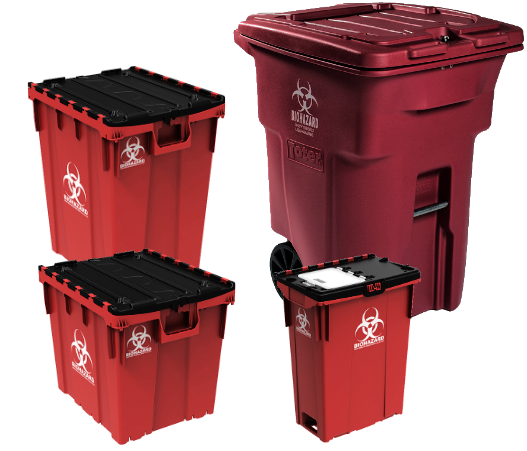Streamlined Solutions: Simplifying Health Care Procedures with Expert Medical Waste Disposal
Streamlined Solutions: Simplifying Health Care Procedures with Expert Medical Waste Disposal
Blog Article
Discovering Different Garbage Disposal Options for a Cleaner Atmosphere
In the quest of a cleaner setting, the management of waste disposal has actually arised as an important focal point for lasting growth. With a wide range of waste disposal choices readily available, ranging from standard land fill methods to innovative waste-to-energy innovations, the option of just how we manage our waste has far-ranging effects for our earth's wellness.
Recycling Approaches
Applying effective recycling approaches is essential in minimizing waste and promoting sustainability in our atmosphere. Reusing entails the procedure of transforming waste materials into recyclable items to protect against unnecessary disposal.
An additional vital recycling approach is composting, which involves disintegrating organic waste like food scraps and backyard trimmings right into nutrient-rich soil. This process not only diverts natural waste from land fills yet additionally produces an important source for horticulture and farming. In addition, upcycling is an imaginative recycling technique that includes changing old or disposed of materials into items of greater top quality or worth. By incorporating these various reusing techniques right into our waste administration methods, we can considerably decrease our ecological impact and relocate in the direction of a more lasting future.

Composting Techniques
Effective waste administration techniques, such as reusing approaches, pave the means for a cleaner environment, and now, shifting the focus to 'Composting Techniques', we check out lasting ways to decompose natural waste for environmental benefit. medical waste removal service.
Composting is an all-natural process that transforms natural waste, like food scraps and yard trimmings, into a nutrient-rich dirt amendment. The key to successful composting hinges on producing the appropriate balance of green products, such as vegetables and fruit scraps, and brown products, like dried out twigs and leaves. These materials disintegrate with the aid of microorganisms, damaging down the waste into useful garden compost.
There are various composting methods available to match various demands. Conventional yard composting involves layering natural products in a bin or stack and routinely turning the mix to aerate it. Vermicomposting, on the other hand, uses worms to damage down natural issue into garden compost (click here). For those with minimal space, indoor composting systems provide a hassle-free option. By making use of composting strategies, we can lower the quantity of waste sent out to landfills while producing an advantageous product for enhancing soil and sustaining plant growth.
Incineration Benefits And Drawbacks
Incineration, as a garbage disposal approach, presents both advantages and disadvantages that merit careful consideration in the realm of lasting waste monitoring practices. On the silver lining, incineration can substantially decrease the volume of waste, minimizing the demand for garbage dump room and potentially lowering greenhouse gas exhausts. Incineration additionally permits the recovery of energy with the generation of electrical power or warmth, adding to source recovery. The process can be made use of to ruin unsafe compounds, offering a safe method for dealing with certain kinds of waste that may position risks to public health and the environment if left unattended.
Furthermore, the high preliminary financial investment and operational costs of incineration centers present financial obstacles, making it a much less economical choice compared to various other waste monitoring strategies. Mindful monitoring and guideline are crucial to mitigate these unfavorable effects and maximize the advantages of incineration as part of an extensive waste monitoring strategy.
Land Fill Monitoring Techniques
Garbage dumps play an important duty in waste monitoring and ecological conservation by providing a control system for the disposal of strong waste products. By condensing the waste, the quantity is minimized, enabling for more waste to be suited over time.
Furthermore, the implementation of daily cover techniques is crucial in lessening odors, avoiding trash, and reducing the destination of bugs. Covering the disposed waste at the end of daily assists to contain odors and avoid potential ecological contamination. Furthermore, the monitoring of landfill gas exhausts and leachate levels is critical in making sure that ecological criteria are satisfied and that any type of potential threats to surrounding communities are decreased.

Waste-to-Energy Technologies
One of the cutting-edge methods to lose monitoring entails harnessing Waste-to-Energy innovations to transform solid waste right click reference into useful energy resources. Waste-to-Energy (WtE) innovations include an array of processes that aim to extract energy from waste products through thermal, chemical, or biological ways. This conversion procedure not only reduces the volume of waste that ends up in land fills yet likewise generates beneficial power resources such as electrical power, warmth, or biofuels.
Incineration involves burning waste at high temperatures to produce warm and electricity. Gasification converts waste into a syngas, which can be made use of for power generation or chemical production.
Carrying out Waste-to-Energy innovations can aid reduce environmental problems linked with traditional garbage disposal techniques while all at once offering a renewable resource resource. Careful factor to consider needs to be given to exhausts control and making certain the sustainability of feedstock materials for these technologies to be genuinely helpful for a cleaner setting.

Conclusion
To conclude, discovering different waste disposal alternatives such as recycling, composting, incineration, garbage dump management, and waste-to-energy innovations is essential for promoting a cleaner atmosphere - click here. Each method has its very own advantages and difficulties, however by making use of a mix of these techniques, we can function in the direction of reducing the quantity of waste that finishes up in land fills and ultimately add to an extra sustainable future for generations to find
With a wide variety of waste disposal choices readily available, varying from traditional garbage dump methods to cutting-edge waste-to-energy innovations, the selection of exactly how we handle our waste has significant effects for our world's well-being. medical waste removal.Incineration, as a waste disposal technique, provides both benefits and downsides that warrant careful factor to consider in the world of sustainable waste administration techniques.Land fills play a critical function in waste monitoring and ecological conservation by supplying a containment system for the disposal of strong waste products. By condensing the waste, the quantity is decreased, permitting for more waste to be suited over time
One of the ingenious methods to lose management involves harnessing Waste-to-Energy modern technologies to convert strong waste right into functional power sources.
Report this page